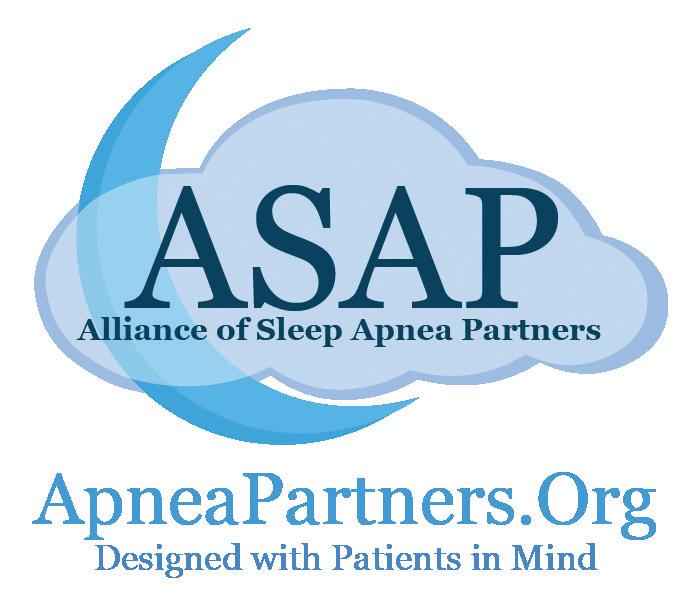
4 minute read
Patient Organization Highlight
Alliance of Sleep Apnea Partners (ASAP)
ASAP is an organization for patients with sleep apnea created by patients with sleep apnea. Kathy Page, Past President of the ASAP Board of Directors explains, “Everything we do, everything we create or try to build, is based around one question: will it help those who have sleep apnea? As patients and members of the board, each one of us comes with a different perspective. Differences in how and when we were diagnosed, how we manage our sleep apnea, problems with mask fittings, insurance issues, finding quality medical help and more. We wanted to create a place where patients could easily find answers.”
Page believes getting diagnosed and adhering to a treatment option are not easy things, so it is paramount to educate oneself about sleep apnea. “Know what kind of sleep apnea you have, the probable cause, the best treatment therapy for you, find a doctor who will help, learn how to tolerate the treatment and where to look for quality, reliable information,” Page reiterates.
ASAP is a nonprofit founded by a multi-stakeholder group of patients, researchers and healthcare providers. ASAP is an affiliate partner of the Sleep Apnea PatientCentered Outcomes Network (myapnea.org), a virtual community of over 20,000 patients. Patients can learn about sleep apnea definitions, types, who is at risk, symptoms and more through their patient website. “Personally,” Page begins, “I had no idea that sleep apnea was so common! When I was diagnosed, I had heard of sleep apnea, but all I really knew was that you had to wear a horrible-looking mask. I had no idea how much harm could be done to your body by leaving sleep apnea untreated. I want people to know it can affect your blood pressure, heart, lungs, brain, and of course—cause daytime sleepiness. I learned there were other treatment options besides the dreaded mask. But the most important thing I learned was that others struggle just like me.”
ASAP plans to raise awareness about
apneapartners.org
through social media efforts and a direct outreach to providers. The site was developed collaboratively by patients and clinicians. It is designed to be a vital sleep apnea resource for individuals, families, caregivers, communities and schools.
—apneapartners.org

20 | January/February 2021
WELL-BEING
4 Things to Know about Sleep & Stress
By Célyne H. Bastien, PhD
The topic of stress and sleep is of the outmost importance as we head into 2021. The unprecedent times we have been living in since March 2020 have had a devastating effect on sleep, especially because of the stress caused by different situations linked to the pandemic such as financial hardship, isolation/confinement, loneliness, fear of catching or seeing a close one catching and dying of COVID-19; working from home, having kids home, etc.
1.) It is normal during periods of stress to feel that our sleep is not of good quality or has
deteriorated. We can take longer to fall asleep, wake up more often during the night or even wake up in the wee hours of the morning without being able to go back to sleep. When we experience sleep difficulties, we may start to worry about our sleep and then get anxious about the fact that we are not getting enough sleep. From there, our health might deteriorate because of the lack of sleep.
We can get ourselves into a kind of vicious circle where stress induces sleep difficulties and sleep difficulties increase stress. And being sleep deprived is associated with emotion dysregulation. Feeling irritated, more depressed, more anxious, lacking concentration and attention are common consequences of sleep deprivation. 2.) Sleep can help stress. By sleeping, your body is relaxing, and your mind is at peace (besides the occasional bad dreams which could be punctually disturbing). Célyne H. Bastien, PhD Thus, if you get a good night’s sleep, your body and your mind is more ‘equipped’ to face stressing situations: your stress coping mechanisms are more effective.

3.) Lighten the mood to lessen the stress. There are many things you can do and they relate mostly to sleep hygiene and general health hygiene: have a nice sleeping environment, make sure you have plenty of time to recuperate, learn something new (cooking, language, etc), talk to family members and friends to release some of the stress, exercise (but no later than four hours before going to bed), watch funny movies, do not use any electronics in your bedroom, attend some relaxation/meditation/ mindfulness/yoga classes and eat well to lighten your mental load and mindset.
4.) Stress during the day, instead of at
night. One other recommendation would be to reserve a time during the day (30-60 minutes) during the day to sit down and take the time to write what stresses you. It will not only give you the opportunity to find solutions to what is stressing you, it will also
Stress continued on page 24
21 | January/February 2021









